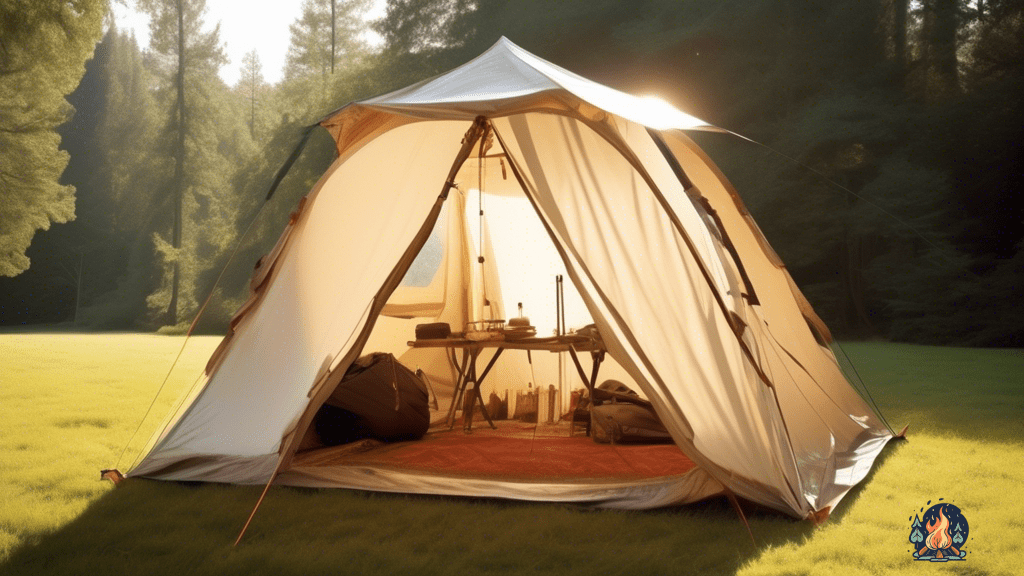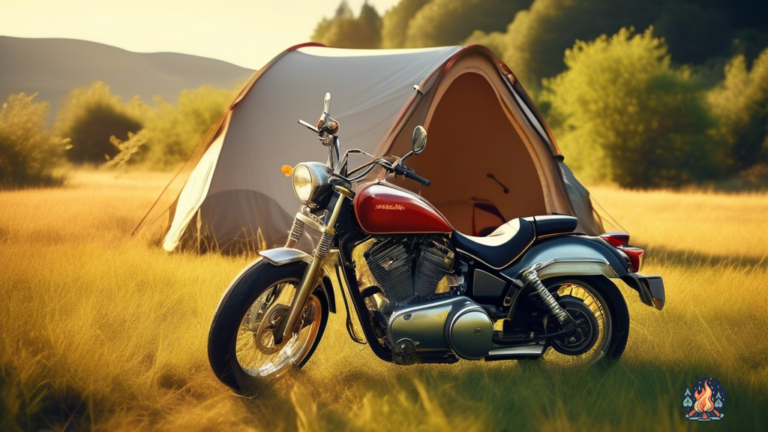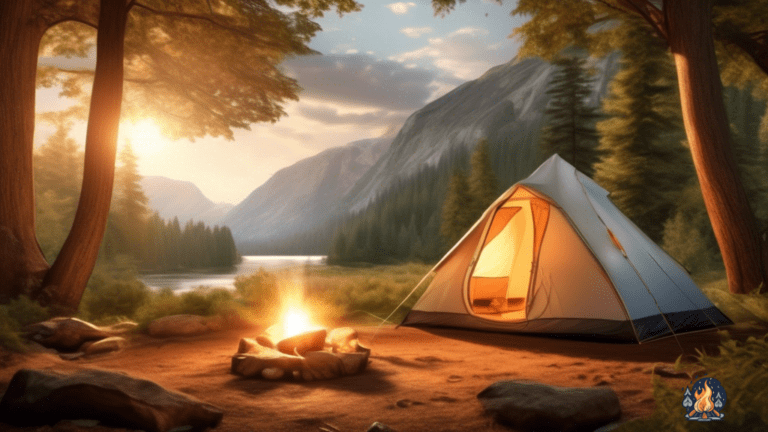Tent Setup For Beginners: A Step-by-Step Guide
by Kevin Fairbanks • Updated: January 30, 2024
Master the art of tent setup with our beginner-friendly step-by-step guide. Get ready for your next outdoor escapade and start pitching your tent like a pro today!

Are you ready to embark on a thrilling adventure into the great outdoors?
Picture this: you’re surrounded by towering trees, the air is crisp and invigorating, and the only sound you hear is the soothing melody of nature.
But before you can immerse yourself in this idyllic setting, you need to tackle one crucial task: setting up your tent. Don’t fret, dear beginner camper, for we are here to guide you every step of the way in this immersive and intimate article.
Setting up a tent may seem daunting at first, but fear not, for we are about to unveil the secrets of tent setup with our step-by-step guide.
Whether you’re a novice camper or someone who hasn’t ventured into the wilderness in quite some time, this article will equip you with the knowledge and confidence to conquer this essential camping skill.
From choosing the right tent to selecting the perfect campsite, we’ll cover it all.
So, get ready to unleash your inner adventurer as we dive into the wonderful world of tent setup.
Key Takeaways
- Choosing the right tent based on size, weather conditions, and personal preferences is crucial for a successful camping experience.
- Selecting a suitable campsite with level ground, shade, proximity to water, and privacy is important for setting up the tent.
- Gathering necessary equipment and supplies, such as tent, sleeping bags, and cooking equipment, is essential for a comfortable camping experience.
- Following a step-by-step guide for setting up the tent will help beginners successfully pitch their tent in the great outdoors.
Choosing the Right Tent for Your Needs
Now that you’ve gathered some basic knowledge about camping, let’s dive into choosing the perfect tent for your adventure! This is where the real magic happens, my friend.
Picture yourself cozied up in your tent, feeling safe and secure, as the sounds of nature lull you to sleep. Ah, bliss! But before we get too carried away, let’s talk about what you need to consider when selecting your tent.
First things first, you’ll want to think about the size of your tent. How many people will be joining you on this epic camping journey? If it’s just you and your trusty sidekick, a smaller tent might do the trick. But if you’re planning to bring the whole gang, you’ll need something a bit more spacious.
Don’t forget to account for your gear too – you’ll want enough room to store all your camping essentials.
Next up, let’s talk about the weather. Mother Nature can be a fickle mistress, so it’s important to choose a tent that can withstand whatever she throws your way. If you’re camping in a place with unpredictable weather patterns, look for a tent that’s designed to handle rain, wind, and even a little snow. Trust me, there’s nothing worse than waking up in a puddle or being blown away by a gust of wind.
So, do yourself a favor and invest in a tent that can brave the elements.
Remember, my friend, choosing the right tent is like finding your soulmate – it’s all about compatibility. Consider your needs, preferences, and the conditions you’ll be camping in. With a little bit of research and some good ol’ intuition, you’ll find the perfect tent that will make your camping experience a dream come true.
Happy tent shopping!
Selecting a Suitable Campsite
First, you’ll want to choose a suitable location for your campsite. This is an important step in ensuring a comfortable and enjoyable camping experience.
Here are a few things to consider when selecting a campsite:
- Level Ground: Look for a spot that is relatively flat and free from any large rocks or tree roots. This will make it easier to set up your tent and provide a more comfortable sleeping surface.
- Shade: If you’re camping during the summer months, finding a campsite with some shade can make a big difference in keeping cool during the day. Look for a spot under a tree or near some bushes that can provide some relief from the sun.
- Proximity to Water: It’s always a good idea to camp near a water source, such as a river or lake. This will make it easier to access water for drinking, cooking, and cleaning. Just make sure to follow any regulations regarding water safety and purification.
- Privacy: While it’s nice to be close to nature, it’s also important to have some privacy. Look for a campsite that is not too close to other campers, so you can enjoy some peace and quiet.
Gathering the Necessary Equipment and Supplies
To ensure a successful camping experience, make sure you have all the necessary equipment and supplies gathered. Having the right gear can make all the difference in your comfort and enjoyment while out in the great outdoors.
First and foremost, you’ll need a tent. Look for one that’s easy to set up and offers enough space for everyone in your group. Don’t forget to bring a groundsheet or tarp to place underneath the tent to protect against moisture and provide an extra layer of insulation.
Additionally, make sure you have enough sleeping bags and sleeping pads for everyone. Opt for sleeping bags that are suitable for the weather conditions you’ll be camping in, whether it’s a lightweight summer bag or a warmer option for cooler nights.
Next, gather cooking equipment such as a camping stove, pots and pans, utensils, and plates and bowls. It’s always a good idea to bring a cooler to keep your food and drinks fresh. Don’t forget to pack a headlamp or flashlight, as well as extra batteries, for those dark nights and early mornings.
Other essential items include a camping chair or two, a first aid kit, insect repellent, sunscreen, and a camping knife or multitool.
Lastly, don’t forget to pack plenty of water and snacks to keep you fueled throughout your camping adventure. By gathering all the necessary equipment and supplies beforehand, you’ll be well-prepared for a memorable and enjoyable camping experience.
Setting Up the Tent: Step-by-Step Instructions
Assembling your shelter is the key to a successful outdoor adventure. Setting up your tent may seem daunting at first, but with these step-by-step instructions, you’ll have your cozy home away from home ready in no time.
First, find a suitable spot to pitch your tent. Look for a level area with no sharp rocks or branches that could damage the floor of your tent. Once you’ve found the perfect spot, follow these simple steps:
- Lay out the footprint or groundsheet of your tent. This will protect the floor of your tent from any moisture or sharp objects on the ground.
- Lay out your tent body on top of the footprint, making sure it’s aligned properly.
- Assemble the tent poles and attach them to the corresponding loops or grommets on the tent body. Make sure they’re securely connected.
- Finally, drape the rainfly over the tent body, making sure it covers the entire tent. Attach it securely using the provided clips or ties.
With your tent set up, you’re ready to enjoy a comfortable night under the stars. Take a moment to appreciate the cozy space you’ve created, and get ready to embark on an unforgettable outdoor adventure.
Can I Use the Tent Setup Guide for Camping 101?
Yes, the tent setup guide for Camping 101 is perfect for beginners. It provides clear and easy-to-follow instructions for pitching a tent, understanding camping gear, and safety tips. These beginner’s camping tips are essential for a successful and enjoyable outdoor adventure.
Tips for a Successful and Comfortable Camping Experience
For a successful and comfortable camping experience, it’s important to keep a few tips in mind.
First, make sure to bring comfortable bedding, such as a sleeping bag or an air mattress. This will ensure that you have a good night’s sleep and wake up feeling refreshed and ready for a day of outdoor adventures.
Additionally, don’t forget to pack extra blankets or layers, as temperatures can drop significantly at night.
Another tip is to plan and prepare your meals in advance. This will save you time and effort during your camping trip. Consider prepping some easy and delicious meals that can be cooked over a campfire or on a portable stove. Don’t forget to pack non-perishable snacks as well, for those times when you need a quick energy boost.
In addition to food and bedding, it’s important to pack appropriate clothing for the weather conditions. Check the weather forecast before you go and pack accordingly. Layers are always a good idea, as they allow you to adjust your clothing to the changing temperatures throughout the day. Don’t forget to bring a raincoat or poncho, just in case.
Lastly, don’t forget to bring some entertainment options. While camping is a great way to disconnect from technology and enjoy nature, it’s always nice to have a few activities to keep you entertained during downtime. Consider bringing a deck of cards, a book, or some outdoor games to play with your camping companions.
By keeping these tips in mind, you’ll be well-prepared for a successful and comfortable camping experience.
So go ahead, pitch that tent and enjoy the great outdoors!
Frequently Asked Questions
How do I choose the right sleeping bag for camping?
Choosing the right sleeping bag for camping is crucial! You need one that’s as cozy as a cloud and as warm as a sauna. Don’t settle for anything less or risk freezing in the wilderness!
What type of camping stove should I bring?
For a camping stove, opt for a lightweight and compact model that’s easy to set up and use. Consider a portable propane stove or a backpacking stove that uses fuel canisters. Look for one with good reviews and a reliable ignition system.
Are there any specific safety precautions I should take while camping?
When camping, safety should always be a priority. To ensure a safe trip, remember to bring a first aid kit, stay hydrated, be aware of your surroundings, and properly store food to avoid attracting animals.
How do I properly store food to prevent attracting wildlife?
To properly store food and prevent attracting wildlife, follow these simple steps: 1) Keep all food sealed in airtight containers. 2) Store it in a locked cooler or bear-resistant container. 3) Avoid bringing strong-smelling foods.
What are some essential camping etiquette tips to follow?
When it comes to camping etiquette, remember to be respectful of other campers and the environment. Clean up after yourself, keep noise to a minimum, and follow any rules or regulations set by the campground.

Hi, I’m Kevin, a lifelong camping enthusiast and the voice behind Campfire Discoveries. From tent to RV to cabin camping, I’ve explored it all. Join me as we share stories and tips around the campfire, deepening our connection with the great outdoors.
Keep Reading
-
Cooking With Cast Iron: Campfire Tips
Learn the essential tips for cooking with cast iron over a campfire to enhance your outdoor culinary skills. From seasoning to cleaning, master the art of cast iron cooking now!
-
On The Road: Choosing The Perfect Tent For Motorcycle Camping
Gear up for your motorcycle camping adventure! Learn how to choose the ideal tent for your trip and hit the road with confidence. Click here now!
-
Enjoy The Outdoors: Camping With A Tent Screen Room
Experience the best of both worlds with a tent screen room – stay bug-free and fully enjoy the outdoors! Click now to elevate your camping experience.



